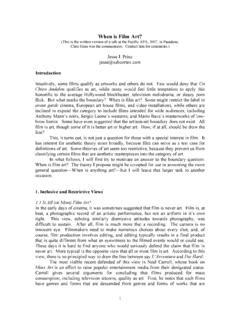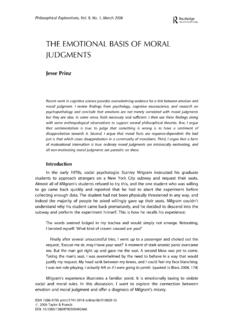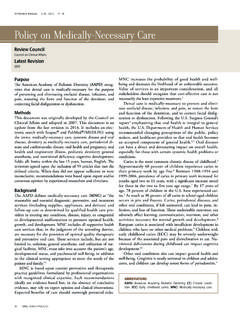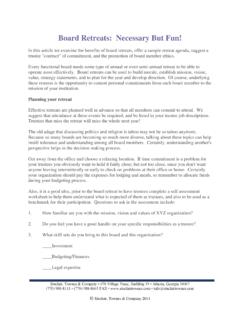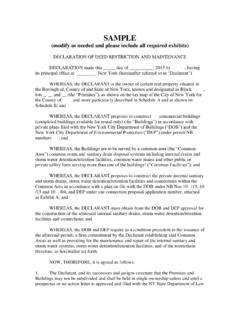Transcription of (Forthcoming in P. Goldie and A. Coplan (Eds.). …
1 1 (Forthcoming in P. Goldie and A. Coplan (Eds.). Empathy: Philosophical and Psychological Perspectives. Oxford University Press.) Is Empathy Necessary for Morality? Jesse J. Prinz 1. Introduction It is widely believed that empathy is a good thing, from a moral point of view. It is something we should cultivate because it makes us better people. Perhaps that s true. But it is also sometimes suggested that empathy is somehow necessary for morality. That is the hypothesis I want to interrogate and challenge. Not only is there little evidence for the claim that empathy is necessary, there is also reason to think empathy can interfere with the ends of morality. A capacity for empathy might make us better people, but placing empathy at the center of our moral lives may be ill advised. That is not to say that morality shouldn t centrally involve emotions. I think emotions are essential for moral judgment and moral motivation (Prinz, 2007).
2 It s just that empathetic emotions are not ideally suited for these jobs. Before embarking on this campaign against empathy, I want to say a little more about the target of the attack. What is empathy? And what would it mean to say empathy is necessary for morality? With respect to the first question, much has been written. Theories of empathy abound. Batson et al. (1995: 1042) define empathy as, as an other oriented emotional response congruent with the perceived welfare of another person. This is not the definition I will be using. Batson s construct might be better characterized as concern, because of its focus on another person s welfare. Indeed, in much of his research he talks about empathetic concern. Notice that this construct seems to be a combination of two separable things. Being concerned for someone is worrying about their welfare, which is something one can do even if one doesn t feel what it would be like to be in their place.
3 One can have concern for a plant, for example, and an insect, or even an artifact, like a beautiful building that has into disrepair. Empathy, seems to connote a kind of feeling that has to be at last possible for the object of empathy. If so, empathetic concern combines two different things a find of feeling for an object and a feeling on behalf of an object. Much of the empirical literature, including the superb research that Batson has done, fails to isolate these components, and, as a result, some of the existing studies are confounded. They purport to show the value of empathy, but may really show the value of concern. My focus below will be on empathy, and I leave it as an open possibility that concern is highly important, if not necessary, for morality. Indeed, concern often seems to involve an element kind of moral anger, which I will argue is very important to morality. It is also important to distinguish empathy from sympathy.
4 Suppose I feel outraged for someone who has been brainwashed into thinking she should follow a cult leader who is urging mass suicide. That would not necessarily qualify as empathy. As Darwall (1998: 261) points out, sympathy is a third person emotional response, whereas empathy involves putting oneself in another person s shoes. But 2 Darwall s definition is also somewhat problematic. He says, Empathy consists in feeling what one imagines he feels, or perhaps should feel (fear, say), or in some imagined copy of these feelings, whether one comes thereby to be concerned .. or not. This definition has two features, which I would like to avoid. First, the appeal to imagination seems overly intellectual. Imagination sounds like a kind of mental act that requires effort on the part of the imaginer. As Darwell recognizes, empathy in its simplest form empathy is just emotional contagion: catching the emotion that another person feels (Hatfield et al.)
5 , 1994; Hoffman, 2000). It seems inflated to call contagion an imaginative act. Also, I want to resist Darwall s application of empathy to cases where one has a feeling that someone should feel, but does not feel. The problem is that this tends to blur the distinction between empathy and sympathy. Suppose I encounter a member of a cult who is delighted by the cult leader s nefarious plans. The cult member should by afraid, but is not. If I feel fear on the cult member s behalf, that is not putting myself in the cult member s shoes. As I will use the term, empathy requires a kind of emotional mimicry. I do not wish to imply that empathy is always an automatic process, in the way that emotional contagion is. Sometimes imagination is requires, and sometimes we experience emotions that we think someone would be experiencing, even if we have not seen direct evidence that the emotion is, in fact, being experienced.
6 For example, one might feel empathetic hope for a marathon runner who is a few steps behind the runner is first place, or anxiety for the first place runner, and the second place runner catches up. We can experience these feelings even if the runners facial expressions reveal little more than muscular contortions associated with concentration and physical exertion. A situation can reveal a feeling. The core idea, as I will use the term, is that empathy is a kind of vicarious emotion: it s feeling what one takes another person to be feeling. And the taking here can be a matter of automatic contagion or the result of a complicated exercise of the imagination. I don t think there is anything anachronistic about this notion of empathy. I think it has a long tradition in moral philosophy, even though the term empathy is only 100 years old. The British moralists, including David Hume and Adam Smith, used sympathy in way that is similar to the way I want to use empathy.
7 Here is Smith (1759: ): Whatever is the passion which arises from any object in the person principally concerned, an analogous emotion springs up, at the thought of his situation, in the breast of every attentive spectator. My question, in the pages that follow, is whether empathy so defined is necessary for morality. I should note again, in advance, that the empirical literature does not always distinguish between the constructs I have been discussing, but I do think that all the studies I discuss below can, by inference at least, shed some light on empathy as defined here. The suggestion that empathy is necessary for morality can be interpreted in at least three different ways. One might hold the view that empathy is necessary for making moral judgment. One might think empathy is necessary for moral development. And one might think empathy is necessary for motivating moral conduct. I think each of these conjectures is false.
8 Empathy is not necessary for any of these things. We can have moral systems without empathy. Of course, it doesn t follow directly that empathy should be eliminated from morality. One might think the modal question Can there be morality without empathy? and the related 3 descriptive question Do our moral responses depend on empathy? are uninteresting. One might even think that the answers to these questions are obviously negative and don t need to be argued for. The interesting question, one might think, is whether empathy should play an integral role in morality. In the final part of this paper, I will offer a skeptical response to this question, and I will draw of the lessons of earlier parts in making this case. I don t think the answers to the necessity claims are obvious. I think empathy looks on initial reflection like an integral part of morality. In seeing why it isn t, we will also begin to see why it shouldn t be.
9 2. Is Empathy Necessary for Moral Judgment? Let s begin with the conjecture that empathy is necessary for making moral judgment. For simplicity, let s restrict the account of judgments that are expressed with the term good and bad. For example, one might judge that charity is good, or that wife beating is bad. According to the view under consideration these judgments depend on empathetic responses: we empathize with the positive feelings experienced by the recipients of charity and with the negative feelings of those who fall prey to domestic violence. It is these empathetic responses that allow one to see these actions as good and bad respectively. Without empathy, we could mouth the words that charity is good and abuse is bad, but we wouldn t speak with true understanding; we wouldn t be grasping the judgments that such sentences have the function of expressing. A view like this can be attributed to David Hume.
10 He writes, We partake of [victims of injustice s] uneasiness by sympathy; and as every thing, which gives uneasiness in human actions, upon the general survey, is called Vice, and whatever produces satisfaction, in the same manner, is denominated [S]ympathy with public interest is the source of the moral approbation, which attends that virtue. (Hume, 1739: ) As I read him, Hume s theory of moral judgment, can be broken down into the following claims: a virtuous action is one that intentionally brings about pleasure and a vicious action is one that intentionally brings about pain; when we contemplate the pleasure or pain of another person, we feel empathy (what Hume calls sympathy ); our empathetic response to the recipients of virtuous and vicious actions arouses in us feelings of approbation and disapprobation, respectively; these feelings of approbation and disapprobation constitute our judgments that something is morally good or bad.

